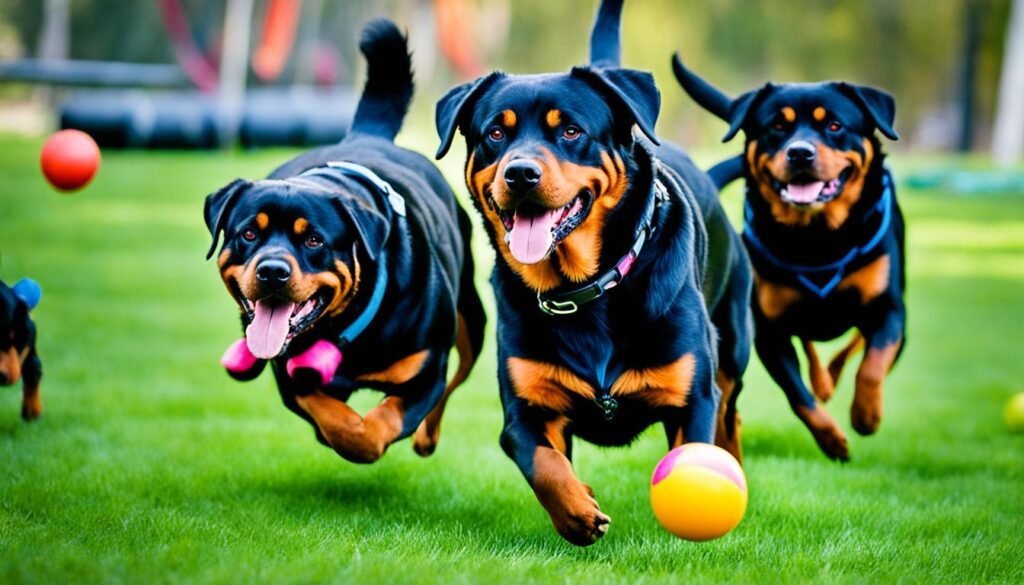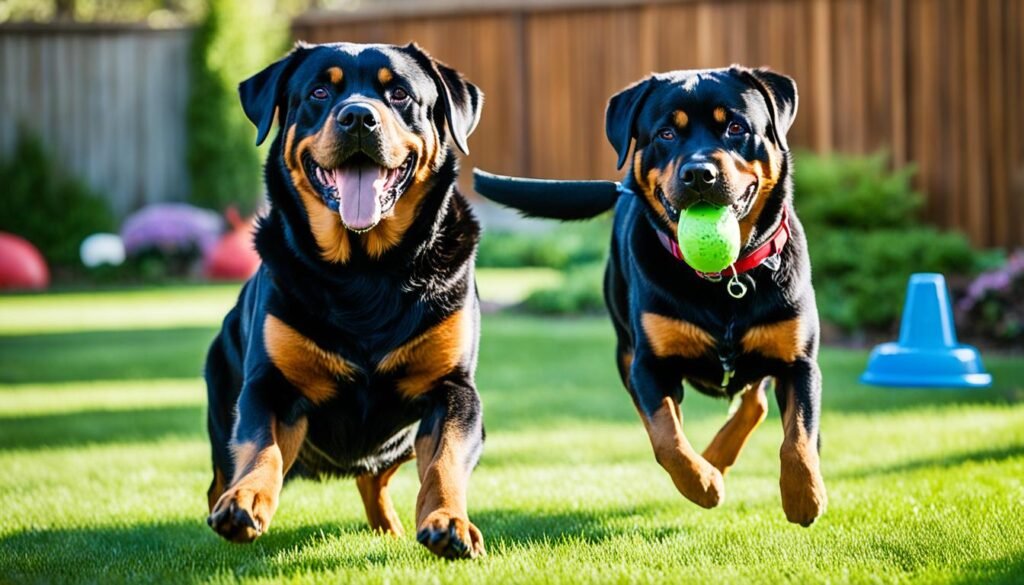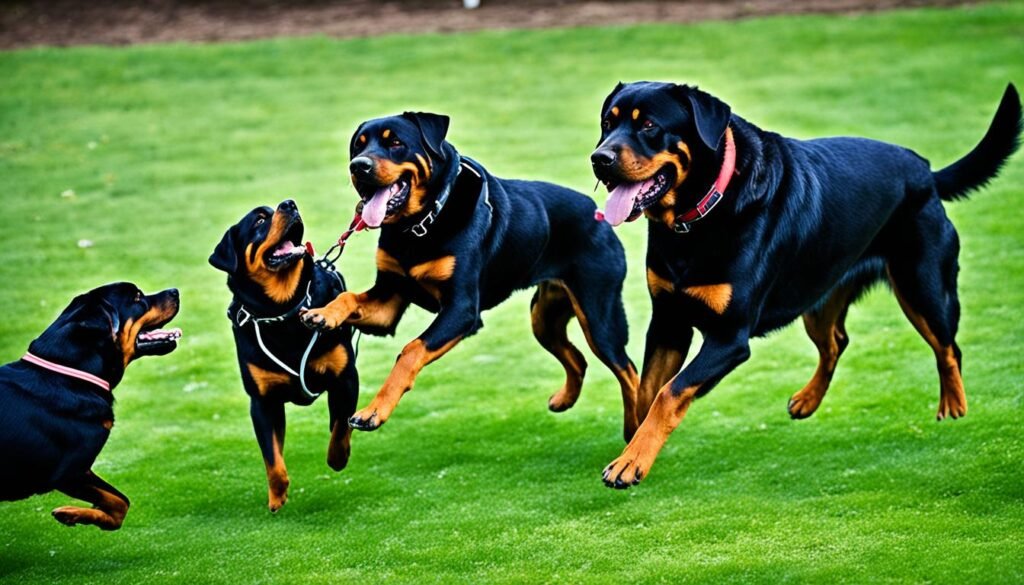When it comes to bringing a new dog into your family, compatibility with other dogs is an important consideration. This is especially true if you already have a Rottweiler or are thinking about getting one. Rottweilers are known for their loyalty, protectiveness, and loving nature, but how do they fare when it comes to interacting with other dogs?
The answer is that Rottweilers can be good with other dogs, but it depends on several factors. Proper training and socialization are key to ensuring that your Rottweiler behaves well around other dogs. Without these, they may display aggressive or antisocial behavior, particularly in male Rottweilers that have not been desexed.
During the critical socialization period between 3 and 16 weeks of age, it’s important to expose your Rottweiler to other dogs in a controlled and positive manner. This helps them learn proper social skills and reduces the likelihood of aggressive behavior later on. Female Rottweilers generally have better socialization abilities than males.
Desexing can also play a role in improving a Rottweiler’s behavior with other dogs. It can reduce aggression and antisocial tendencies in both males and females. However, it’s essential to weigh the potential negative health effects of early desexing before making a decision.
Introducing a new dog to your Rottweiler should be done with care. It’s recommended to consider a significant age gap between the dogs and potentially having a dog of the opposite gender. This can help prevent territorial issues and competition for dominance.
Rottweilers can also learn to socialize with smaller dogs if introduced at a young age and taught to be gentle. Having a smaller dog as a companion can help improve their social skills and overall compatibility with other dogs.
Socialization can occur in various settings, such as meeting other dogs in friends or family homes, at the beach, in dog parks, or through dog training classes. The goal is to expose your Rottweiler to different dogs and environments in a positive and controlled way.
Key Takeaways:
- Rottweilers can be good with other dogs when trained and socialized properly.
- Early socialization between 3 and 16 weeks of age is crucial for Rottweilers.
- Female Rottweilers are generally better at socializing with other dogs than males.
- Desexing can reduce aggression and antisocial behavior in Rottweilers.
- Introducing a new dog to the household should be done cautiously, considering age gaps and gender.
Rottweiler Temperament and Behavior with Other Dogs
Rottweilers have a reputation for being loyal, protective, and loving dogs. However, their temperament and behavior towards other dogs can vary depending on their socialization and training. Early socialization is crucial to ensure that Rottweilers are not shy or aggressive towards other dogs. They need to be taught that other dogs are not a threat and that aggressive or antisocial behavior is not acceptable.
Rottweilers can be trained to get along with other dogs, both inside and outside the house, but it requires consistent and positive reinforcement training. Female Rottweilers are generally more level-headed and may get along better with other dogs compared to males. It’s important to introduce Rottweilers to other dogs at a young age and provide ongoing training and socialization to improve their behavior and compatibility with other dogs.
Best Companion Breeds for Rottweilers

If you are considering getting a companion for your Rottweiler, there are several breeds that are considered to be compatible. These breeds share similar exercise needs and can provide companionship for Rottweilers.
- The German Shepherd: Often compared to the Rottweiler, German Shepherds share similar traits and energy levels. They are confident and enjoy exercise, making them potential playmates for Rottweilers.
- The German Shorthaired Pointer: Known for its energy and agility, the German Shorthaired Pointer can be a good match for the occasionally rambunctious Rottweiler.
- The Border Collie: With its intelligence and energy, the Border Collie is also considered a good fit to live with a Rottweiler.
Common Health Problems in Rottweilers

Rottweilers, like many purebred dogs, are prone to certain health problems. It’s important for Rottweiler owners to be aware of these common health issues in order to provide proper care and early intervention.
Heart Problems
- Subaortic stenosis
Joint Issues
- Cruciate ligament damage
- Elbow dysplasia
- Hip dysplasia
Respiratory Conditions
- Juvenile laryngeal paralysis and polyneuropathy
Inherited Eye Diseases
- Cataracts
- Progressive retinal atrophy
- Entropion
Bone and Cartilage Disorders
- Osteochondrosis dissecans (OCD) of the hock, shoulder, or stifle
Cancer
- Osteosarcoma
- Lymphoma
Skin Issues
- Hot spots
To minimize the risk of these health conditions, it’s crucial to ensure that both parents of a Rottweiler puppy have been screened for these conditions before breeding. Regular vet check-ups and preventive healthcare, including vaccinations and parasite control, are essential for maintaining the overall health and well-being of Rottweilers.
Caring for Your Rottweiler

Proper care is essential to ensure your Rottweiler’s well-being. Here are some important aspects to consider when caring for your furry friend:
- Rottweiler Care: Rottweilers require consistent care, including regular veterinary check-ups, vaccinations, and preventive healthcare. It’s important to monitor their overall health and address any potential issues promptly.
- Rottweiler Grooming: Rottweilers have short, dense coats that are fairly low-maintenance. However, they do shed, so regular brushing is necessary to remove dead hairs and keep their coat shiny. This can also help prevent matting and skin problems.
- Rottweiler Exercise: Rottweilers are an active breed and require plenty of exercise to keep them physically and mentally stimulated. Regular walks, playtime, and interactive toys are essential to prevent boredom and destructive behavior.
- Rottweiler Training: Firm but fair training is important for Rottweilers. Positive reinforcement techniques, such as rewards and praises, work best for them. It’s essential to start training early and be consistent to foster good behavior and obedience.
- Rottweiler Socialization: Early socialization is crucial for Rottweilers to grow up as confident and well-adjusted dogs. Exposing them to various environments, people, and other dogs in a positive manner helps them develop good social skills and reduces the risk of aggression or fearfulness.
- Rottweiler Diet: Providing a balanced and nutritious diet is vital for your Rottweiler’s health. Consult with a veterinarian to determine the appropriate portion sizes and choose high-quality dog food that meets their specific dietary needs.
By following these guidelines, you can ensure that your Rottweiler remains happy, healthy, and a beloved member of your family.
Conclusion
Rottweilers can be great companions for other dogs when they receive proper training, socialization, and care. Starting the socialization process at a young age and providing consistent training is essential to ensure they interact well with other dogs. Female Rottweilers generally have a more positive temperament towards other dogs, and desexing can help reduce aggression and antisocial behavior in both males and females.
When introducing a new dog to the household, it’s important to consider the age gap and gender of the dogs. Careful introductions and monitoring their interactions can help establish a harmonious relationship. Additionally, there are companion breeds that are known to be compatible with Rottweilers, offering potential playmates and companions.
Regular veterinary check-ups and preventive healthcare are crucial to address any potential health issues that Rottweilers may face. By providing the right care, training, and socialization, Rottweilers can become well-behaved, dog-friendly pets that can fit in well with the family.
FAQ
Are Rottweilers good with other dogs?
Rottweilers can be good with other dogs if they have been trained, socialized, and given proper care.
What is the temperament and behavior of Rottweilers with other dogs?
The temperament and behavior of Rottweilers towards other dogs can vary depending on their socialization and training.
What are the best companion breeds for Rottweilers?
German Shepherds, German Shorthaired Pointers, and Border Collies are considered compatible companion breeds for Rottweilers.
What are common health problems in Rottweilers?
Rottweilers are prone to conditions such as heart problems, cruciate ligament damage, hip dysplasia, and certain cancers, among others.
How should I care for my Rottweiler?
Caring for a Rottweiler includes regular exercise, training, grooming, and providing a balanced diet, as well as proper socialization and vet check-ups.
What can I expect regarding Rottweiler breed compatibility and socialization?
Rottweilers can be good with other dogs if they are trained, socialized, and given proper care.
